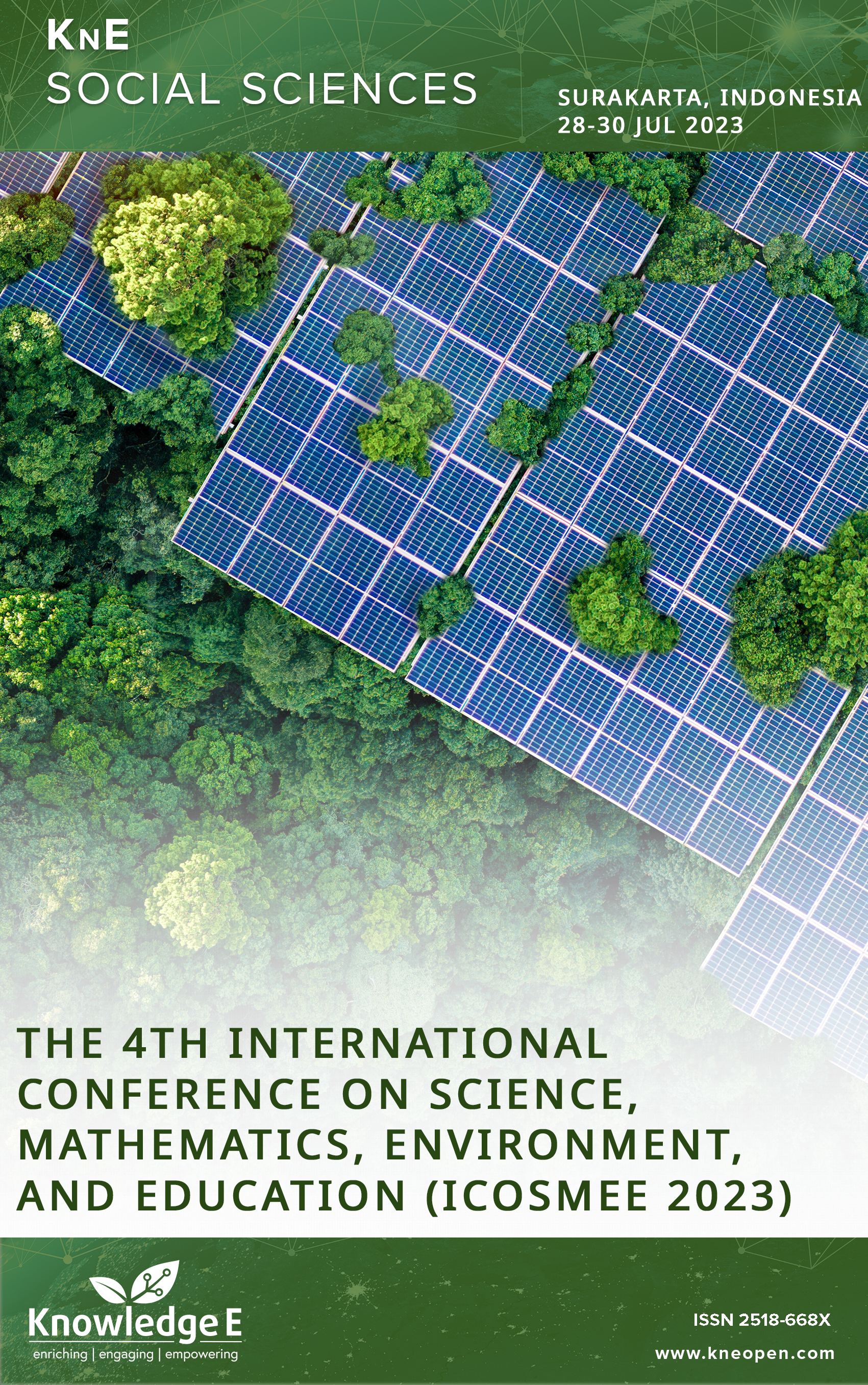STEAM Education and Mathematics Literacy: A Systematic Literature Review (SLR)
DOI:
https://doi.org/10.18502/kss.v10i11.18735Keywords:
mathematical literacy, SLR, STEAMAbstract
The journey of education has entered a new era where mastery in the fields of science, technology, and mathematics has become the main discourse in all sectors of human life. Development of mathematics learning models that can integrate science, technology, engineering, art, and mathematics (STEAM) through its implementation in learning that is able to trigger students to be creative and critical in the learning process. STEAM provides a new approach in the world of education that can be the ability to innovate and think critically and improve cognitive, psychomotor, and respective aspects. This study discusses how the STEAM model and approach and mathematical literacy skills are studied using systematic literature reviews (SLR) approach. This research aims to provide benefits related to STEAM. This study used Preferred Reporting Items for Systematic Reviews and Meta-analyse (PRISMA ) method obtained from journals related to this theme. Data collection was done by specifying the source of the data, namely, Elsevier. From this study, the authors filtered 2968 articles into 1580 based on open access, available subscriptions, and only currently published, which were then filtered into 108 by mathematical subjects. Finally, 20 articles met the criteria for appropriate research admission. The findings of this study show that STEAM is an integrated learning approach that encourages students to think more broadly about problems that occur in the real world, especially mathematical literacy skills. The STEAM-based learning approach provides students with learning experiences that are interconnected with science, technology, engineering, art, and math. This makes students richer in relation to solving problems encountered regarding mathematical literacy.
References
Agry FP, Katono K. Implementasi untuk Model STEAM (Sains, Technology, Engineering, Art, and Mathematic): Pembelajaran Matematika untuk Mahasiswa Pendidikan Guru Sekolah Dasar. In: Prosiding Seminar Nasional Pascasarjana. 2021. p. 126–9.
Afsari S, Safitri I, Harahap SK, Munthe LS. Systematic Literature Review: Efektivitas Pendekatan Pendidikan Matematika Realistik Pada Pembelajaran Matematika. Indonesian Journal of Intellectual Publication. 2021;1(3):189–97. DOI: https://doi.org/10.51577/ijipublication.v1i3.117
An S. The impact of STEAM integration on preservice teachers’ disposition and knowledge. Journal of Research in Innovative Teaching & Learning. 2020;13(1):27– 42. DOI: https://doi.org/10.1108/JRIT-01-2020-0005
Laherto A, Rasa T. Facilitating transformative science education through futures thinking. On the Horizon. The International Journal of Learning Futures. 2022;30(2):96–103. DOI: https://doi.org/10.1108/OTH-09-2021-0114
Ghaffari M, Rakhshanderou S, Ramezankhani A, Mehrabi Y, Safari-Moradabadi A. Systematic review of the tools of oral and dental health literacy: assessment of conceptual dimensions and psychometric properties. BMC Oral Health. 2020 Jul;20(1):186. DOI: https://doi.org/10.1186/s12903-020-01170-y
Muzaki A, Masjudin D. Mosharafa: Jurnal Pendidikan Matematika Analisis Kemampuan Literasi Matematis Siswa. Moshafara. Jurnal Pendidikan Matematika. 2019;8(3):493–502. DOI: https://doi.org/10.31980/mosharafa.v8i3.557
Widiasih R, Hermayanti Y, Ermiati. Ermiati, Hermayanti Y. International Students’ Experience of Studying at Indonesian Universities: A Systematic Review. J Int Stud. 2020;10 S3:24–43. DOI: https://doi.org/10.32674/jis.v10iS(2).2710
Askie L, Offringa M. Systematic reviews and meta-analysis. Semin Fetal Neonatal Med. 2015 Dec;20(6):403–9. DOI: https://doi.org/10.1016/j.siny.2015.10.002
Cheong AJ, Wang SK, Woon CY, Yap KH, Ng KJ, Xu FW, et al. Obstructive sleep apnoea and glaucoma: a systematic review and meta-analysis. Eye (Lond). 2023 Oct;37(15):3065–83. DOI: https://doi.org/10.1038/s41433-023-02471-6
Li Y. International Journal of STEM Education - A platform to promote STEM education and research worldwide. Int J STEM Educ. 2014;1(1):1–2. DOI: https://doi.org/10.1186/2196-7822-1-1
Fowler WA. From Steam to Stars to the Early Universe. Annu Rev Astron Astrophys. 1992;30(1):1–9. DOI: https://doi.org/10.1146/annurev.aa.30.090192.000245
Nurhikmayati I. Implementasi Steam Dalam Pembelajaran Matematika. Didactical Mathematics. 2019;1(2):41–50. DOI: https://doi.org/10.31949/dmj.v1i2.1508
Smith EP, Kelly J, Sappington S, Warren K, Jansen A. Using Judicious Telling to Strengthen Literacy in Mathematics. Mathematics Teacher: Learning and Teaching PK-12. 2023;116(2):115–23. https://doi.org/10.5951/MTLT.2022.0053. DOI: https://doi.org/10.5951/MTLT.2022.0053
Bailey NG, McCulloch AW. Describing critical statistical literacy habits of mind. J Math Behav. 2023;70:101063. DOI: https://doi.org/10.1016/j.jmathb.2023.101063
Madyaratria DY, Wardono W, Prasetyo AP. Kemampuan Literasi Matematika Siswa pada Pembelajaran Problem Based Learning dengan Tinjauan Gaya Belajar. PRISMA, Prosiding Seminar Nasional Matematika; 2019. pp. 648–58.
Lemke JL. Metamedia literacy: Transforming meanings and media. In: Handbook of Literacy and Technology: Transformations in a Post-Typographic. 1998. p. 283301.
Manetti G, Bellucci M, Oliva S. Unpacking dialogic accounting: a systematic literature review and research agenda. Account Audit Account J. 2021;34(9):250–83. DOI: https://doi.org/10.1108/AAAJ-08-2020-4736
Ernest P, Skovsmose O, van Bendegem JP, Bicudo M, Miarka R, Kvasz L, et al. The philosophy of mathematics education. The Philosophy of Mathematics Education. Springer Nature; 2016. 1–330 p. DOI: https://doi.org/10.1007/978-3-319-40569-8_1
Hashim MA, Tlemsani I, Matthews R. Correction: higher education strategy in digital transformation. Educ Inf Technol. 2022;27(5):7379. DOI: https://doi.org/10.1007/s10639-022-10924-w
Published
How to Cite
Issue
Section
License
Copyright (c) 2025 Agung Pratikno, Triyanto, Farida Nurhasanah

This work is licensed under a Creative Commons Attribution 4.0 International License.

